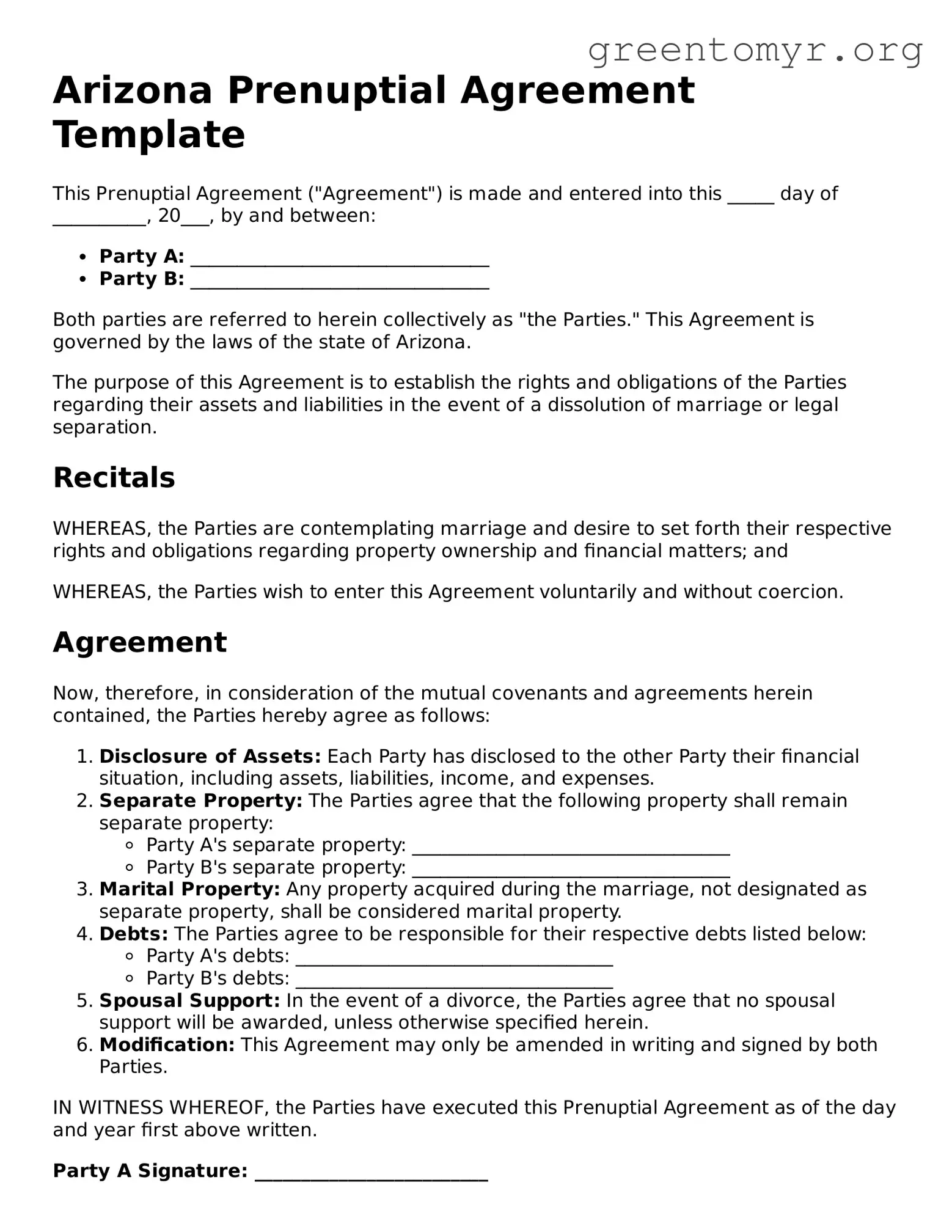What is a prenuptial agreement in Arizona?
A prenuptial agreement, often referred to as a prenup, is a legal document created by two individuals before they marry. This agreement outlines the division of assets and responsibilities should the marriage end in divorce or death. In Arizona, prenups can address various matters, including property rights, financial responsibilities, and spousal support, helping couples manage their financial futures effectively.
Why should I consider a prenuptial agreement?
Considering a prenup can provide peace of mind and financial security. It helps to clarify each partner's rights regarding property and debt. Couples may wish to protect family inheritance, address business ownership, or define financial arrangements in the event of a separation. A prenup can facilitate open discussions about finances, ultimately promoting transparency in the marriage.
How is a prenuptial agreement created in Arizona?
To create a valid prenuptial agreement in Arizona, both parties must willingly disclose their financial information. This includes income, assets, and liabilities. The agreement should be drafted in writing, signed by both individuals, and ideally, witnessed or notarized. Legal counsel can be beneficial to ensure that both parties understand their rights and the implications of the document.
Can I change a prenuptial agreement after it is signed?
Yes, prenuptial agreements can be modified after they are signed. However, modifications typically require a new written agreement, signed by both parties. Major life changes, such as the birth of children or significant changes in financial status, may prompt a review and update of the prenup. Communication is key to ensuring that the agreement reflects the couple's current circumstances and intentions.
Are there any issues that cannot be included in a prenuptial agreement?
While many topics can be addressed in a prenup, certain issues may not be enforceable in Arizona. For example, agreements that waive child support or restrict parenting time after a divorce may not be upheld. It is essential to focus on property division, financial obligations, and other relevant matters that can be agreed upon without violating public policy.
What happens if my spouse and I do not sign a prenuptial agreement?
If you do not have a prenuptial agreement, your marital property will be divided according to Arizona's community property laws in the event of a divorce. This means that assets and debts acquired during the marriage will generally be considered jointly owned and split equally. Without a prenup, you may not have control over how your assets are divided, which can lead to unwanted outcomes.
Is a prenuptial agreement enforceable in Arizona?
Yes, prenuptial agreements are generally enforceable in Arizona, provided they meet specific legal requirements. For the agreement to be valid, both parties must enter into it voluntarily, the terms should be fair and reasonable, and both individuals must have had the opportunity to consult with independent legal counsel. Courts in Arizona respect prenups as long as they do not contain unlawful provisions.
How long before the wedding should a prenuptial agreement be signed?
It is advisable to allow ample time to negotiate and finalize a prenuptial agreement well before the wedding day. Couples should aim to complete the process at least a few months in advance. Rushing to sign a prenup close to the wedding may raise concerns about coercion, potentially jeopardizing its enforceability.
Can a prenuptial agreement protect family businesses?
Yes, a prenuptial agreement can be an effective tool for protecting family businesses. Owners can specify that the business remains separate property, preventing it from being automatically classified as community property during a divorce. This protection is crucial for preserving family legacies and ensuring that business operations remain undisrupted by personal matters.
Should both parties hire separate attorneys for a prenup?
While it is not legally required, it is highly recommended for both parties to retain separate legal counsel when creating a prenuptial agreement. This ensures that each person fully understands their rights and the implications of the agreement. Having independent representation can help avoid potential conflicts of interest and enhance the fairness and transparency of the document.
